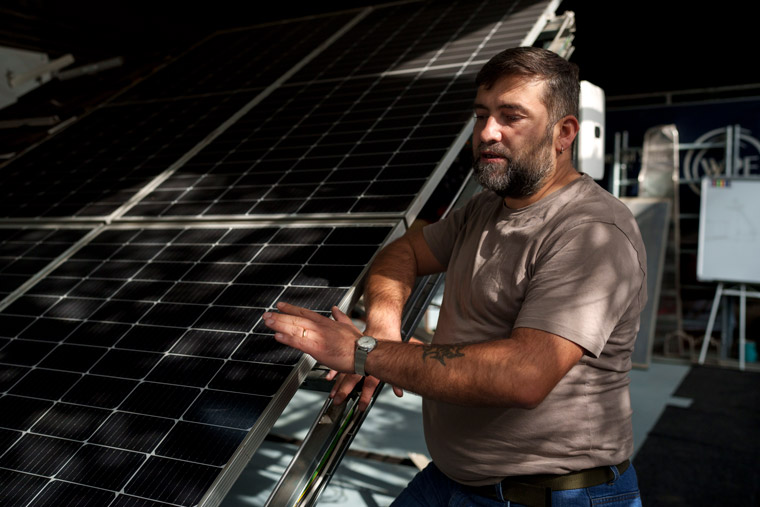PETRILA, Romania (AP) — For many years, Sebastian Tirinticǎ worked in a coal mine, just like his father and grandfather before him.
These days, Tirinticǎ, now 38, is largely surrounded by solar panels and wind turbines as he travels across Romania to train former coal workers and others for jobs in renewable energies.
It’s been a huge professional shift for a worker from one of the main coal regions of this formerly Communist Eastern European country.
“It’s hard to unglue yourself from something you did your entire life,” said Tirinticǎ, who has a short beard sprinkled with grey hair. “It’s hard to start again from zero, and not everyone has the strength and courage to do it.”
Romania hopes to find more workers like Tirinticǎ, but they are hard to come by.
In a region where coal mining was once a driving economic force, coal miners are witnessing a slow and steady decline of a decades-old industry as Romania prepares to phase out all coal-based activities by 2032.
However, not many miners have taken the leap to equip themselves with new skills, even when presented with opportunities, as tradition, uncertainty and fear keep people wedded to what they know. This is sometimes one of the largest challenges of the green energy transition: changing hearts and minds.
For that to happen, coal workers need incentives and guarantees, which experts say do not exist. The lack of a targeted strategy, mixed political messages and distrust are some of the main barriers for transforming regions that have long depended on coal.
Tirinticǎ initially hesitated to make the jump. He was one of 10 miners who could have received free training and a job as a wind turbine installer as part of a pilot project in 2019. He declined because it would have taken him to Germany and away from his wife and two daughters.
Today, he said he is the only one of those original 10 who had left the coal industry. He did so in 2022 after having gone through two reskilling courses the year before, totalling about a month. Tirinticǎ learned the basics of how to install solar panels on different surfaces and how to fix wind turbines, including first aid procedures and how to deal with heights. He later took additional specialized courses to train others in gaining new skills.
Romania, a European Union member country of about 19 million people, is known for its medieval castles in the region of Transylvania. The country has a flourishing information technology and software services sector, along with a good manufacturing and agricultural base. Yet unemployment in rural areas, corruption and bureaucracy are challenges. Millions have left in recent years in search of better economic opportunities.
A shift to a greener economy is also upending the country’s energy sector, adding to the reluctance of some miners to embrace change amid an uncertain future.
Workers at the Oltenia Energy Complex (CE Oltenia), one of Romania’s largest energy companies primarily involved in coal-based energy production in the southwestern county of Gorj, had the chance earlier this year to pursue an 18-day course to become an accredited installer of solar photovoltaic panels.
This summer, about 100 people completed the course provided by RenewAcad, a reskilling program spearheaded by renewable energy company Monsson and sponsored by energy major OMV Petrom.
Although a success for the project, the number represents only about 1.3% of CE Oletenia’s workforce of about 8,000 employees across the company’s mines and coal-based power plants.
In 2021, the RenewAcad project targeted a group of 800 coal-based workers for reskilling as solar panel and wind turbine installers. But the search for applicants had to be broadened to other parts of the country because the sign-up rates from the mining regions wasn’t high enough.
“Grandpa, great-grandpa worked in the mine, what will the neighbor say if I leave the industry?” said Sebastian Enache, business development manager at Monsson, who is overseeing the project, explaining the reluctance of many coal miners.
The average monthly salary for a coal miner is around 800 to 1000 euros, locals say, but can also be higher for those working in power plants or with more education. Entry level salaries for solar panel installers are similar but often involve traveling across the country or abroad, making the switch less attractive.
Workers who participated in the Romanian training had to take time off or do the almost four-week course between their shifts, which was a disincentive.
“You can imagine the interest would have been much higher if people didn’t have to take vacation for it,” said Ciprian Nacu, 39, chief engineer at one of the main power plants in the region, who enjoyed the solar installer course after initially hesitating. He also runs a small lighting company and wants to slowly expand it towards PV installations.
The reskilling course is set to start again in November.
Locals worry that the closure of coal-based activities will bring poverty to their areas, which neighboring regions experienced as hundreds of mines started to close after the fall of Communism in the 1990s.
“We are not connected to any European road, we don’t have a highway, who is going to come here and make something new?” said Constantin Buzarin, vice president at Ecocivica Gorj, a local nonprofit.
The renewables sector is expected to create thousands of jobs, but they will likely be spread across the country and appeal to people with different professional backgrounds.
Gorj County’s troubles reflect the struggles many regions across Europe and the United States encounter as coal phase-out plans continue and decarbonization efforts gain momentum. Failure to ensure reskilling and economic opportunities for former fossil fuel workers could lead to inequalities, according to a recent labor market report from the Organization for Economic Co-operation and Development.
Romania received 2.14 billion euros through the EU’s Just Transition Fund, set up to help transform European regions that historically have focused on fossil fuel production. Gorj County received the highest share, 550 million euros, which is set to gradually go to a series of programs through 2027, including one to reskill coal workers, according to the European Commission.
Although Romania’s coal industry is on its way out, the topic remains politically sensitive, especially ahead of the parliamtradentary elections set to take place on Dec. 1, as the mining community still represents a powerful voting bloc.
“There is no political vision that can show people the light at the end of the tunnel,” said Eliza Barnea from CEE Bankwatch Network, a climate-focused nonprofit.
Alin Şipanu, Gorj County council representative working on the energy transition, sees some progress, however. At the launch of the reskilling project earlier this year, workers who showed up were curious about what they could learn. A few years ago, when the energy transition talk started popping up in the region, workers were outwardly hostile.
“Four years ago, the topic was taboo,” Şipanu said. “You would have seen tomatoes flying.”
___
EDITOR’S NOTE: This story is a collaboration between The Associated Press and Cipher News.
___
The Associated Press’ climate and environmental coverage receives financial support from multiple private foundations. AP is solely responsible for all content.
Tagged with mining





